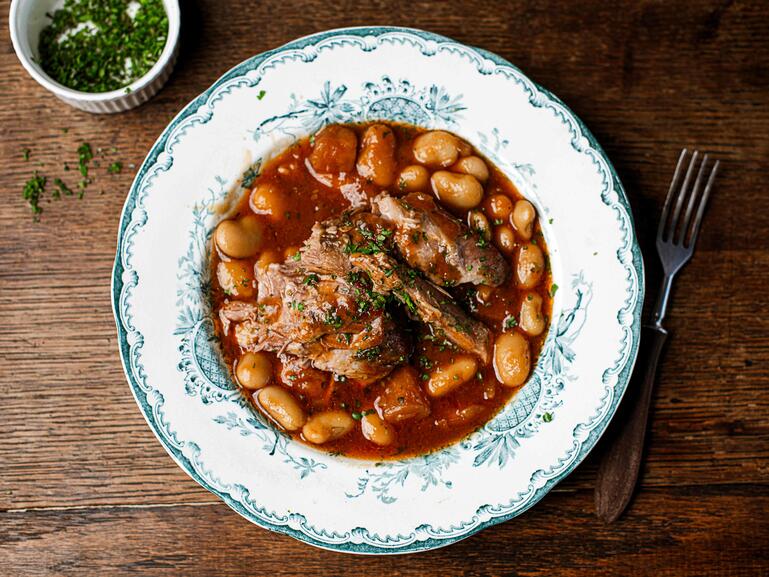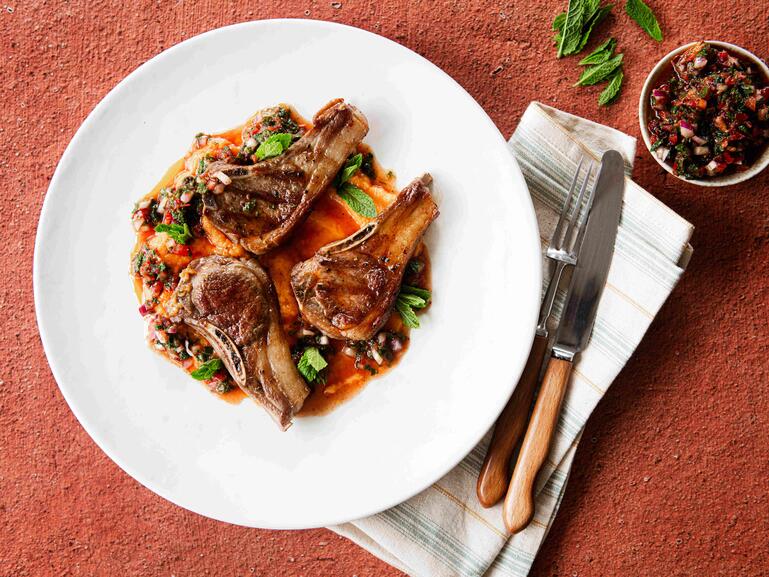
Method
Understanding how to roast a leg of lamb can be useful when it comes to special occasions such as Easter dinner or Christmas. These centrepiece joints can be the perfect showstopper the whole family can enjoy with your favourite seasonal vegetables. Discover our recipe for roasting a succulent, grass-fed leg of lamb now.
Top tip: You will need a large, heavy based roasting tray for this recipe.
- Remember to remove your leg of lamb out of the packaging, pat dry and bring to room temperature at least 30 minutes to 1 hour before you want to start roasting it. If your meat has been in the freezer, refer to our leg of lamb defrosting guide to ensure it's fully thawed before beginning the recipe.
- Preheat your oven to 200°C temperature fan assisted or 215°C without a fan.
- For this leg of lamb recipe, choose a large, heavy based roasting tray, ideally with deep sides and handles for easy movement.
- Massage a little goose or duck fat or even a light olive oil if the leg of lamb does not have a generous coating of fat. You then want to season the meat with good quality, fine sea salt. Leave the meat on the side while you prepare the bed of vegetables.
- Make a trivet of vegetables by roughly chopping equal amounts of onion, carrot and celery or my preferred choice of celeriac (the root of the celery). Also add a bay leaf, sprig of thyme and a few black peppercorns Another nice addition can be a head of garlic split in half.
- Next, place the leg of lamb skin side up onto the trivet which should line the base of the tray.
- Place the roasting tray, with the leg of lamb in, in the centre of the oven and roast for 20 minutes then reduce the temperature to 190℃ and continue roasting for 30 minutes per 500g reaching a core temperature of minimum 58°C.
- Alternatively, add half a bottle of white wine and the same amount of water to the tray and pot roast after the initial 20 minutes. This method means you roast by covering with tin foil and cooking to 140°C for 5 to 6 hours. By slow cooking using this method, you can ensure the meat comes away easily from the bone.
- Once the time is finished, remove the leg of lamb from the oven and pop onto a clean tray and keep warm by covering with a sheet of tin foil. You then want to leave the lamb resting for a minimum of 20 minutes before carving, leaving the roasted vegetables in the tray for the gravy.
- For the gravy I make up 500 ml of essential cuisine lamb stock, then deglaze the roasting tray with this stock, stirring all the caramelised juices from the tray. I then pass through a fine sieve pushing all the juices from the vegetables into a clean saucepan, bring to the simmer and thicken if required by whisking in a teaspoon of corn flour mixed with a little cold water and reduce till you reach a rich glossy gravy.
What is a trivet of vegetables?
A trivet of vegetables refers to a selection of vegetables, traditionally carrots, onions and celery, which are used as a bed for meat to roast or braise upon. This selection of vegetables provides not only a lot of flavour to the meat, in this case roast leg of lamb, but also to a potential sauce to accompany the meat. All the juices (both meat and vegetable) can be used in a nutritious gravy or stock and can be the finishing touch to the perfect sunday roast dinner meal.
What does 'deglaze' mean?
Deglaze means to simply add liquid to a hot pan, to help release the caramelised bits that may have otherwise been stuck to the bottom of the pan. It is a traditional method you may use when roasting meat with a trivet of vegetables. Often you may be deglazing a pan for 3 to 4 minutes before creating a gravy or stock.







